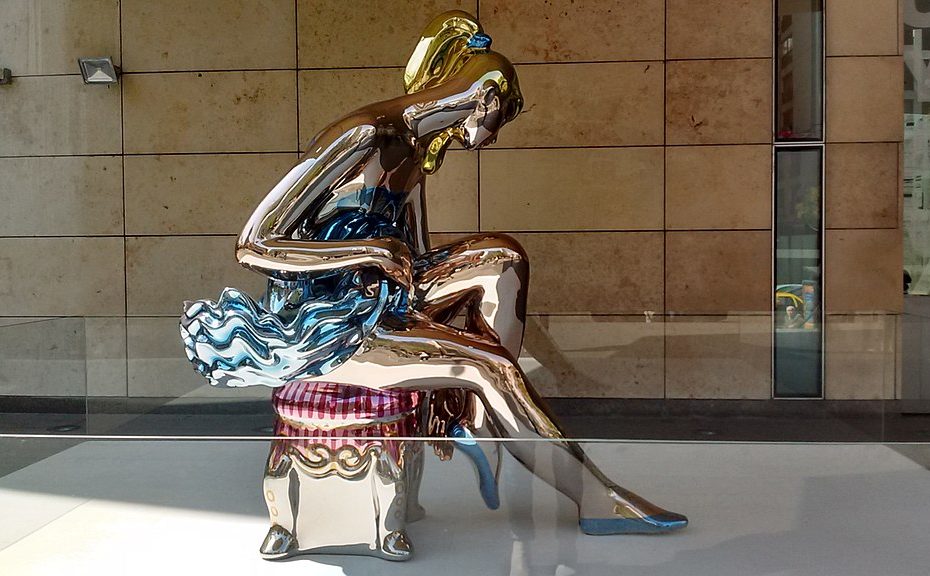In recent years, artworks by appropriation artist Jeff Koons have come under scrutiny in French courts. In 2018, the High Court of Paris ordered Jeff Koons, Jeff Koons LLC, and the Centre Pompidou to pay Franck Davidovici, the author of an advertisement which Jeff Koons appropriated in creating a sculpture entitled Faits d’Hiver, €135,000 for copyright infringement.[1] Jeff Koons LLC was also fined €11,000 for reproducing the work on its website.
More recently, on 17 December 2019, the Paris Court of Appeal upheld a 2017 ruling of the High Court of Paris, confirming that a sculpture from Koons’s Banality series entitled Naked plagiarised a black and white photograph by Jean-François Bauret titled Enfants.[2] The Court held that the Centre Pompidou and Jeff Koons LLC infringed Jean-François Bauret’s copyright by publishing reproductions of Naked in advertisements for the 2014 retrospective exhibition at the museum. The defendants were ordered to pay €20,000 in damages for the infringement to Jean-François Bauret’s estate and Jeff Koons LLC was ordered to pay an additional €4,000 for the use of photographs of Naked on its website.
The French Approach to Copyright Infringement in the Context of Appropriation Art
In France, creators enjoy copyright protection in original works. Originality is determined through a fact-based assessment which seeks to determine whether the characteristics of a work are the result of a creative effort which “endows the work with the personality of its author”. Copyright infringement, in turn, is determined through an analysis of the similarities, rather than the differences, between two works. If the characteristics which together constitute the originality of a work are copied in a secondary work, the secondary work will be deemed an infringement of copyright unless a relevant defence can be relied upon. French law offers a list of nine defences in article L122-5 of the French Intellectual Property Code. Defendants in copyright infringement actions can rely, for example, on exceptions for private use, criticism, reproductions for educational purposes, review, news reporting, caricature, parody and pastiche. Importantly, these exceptions can only be relied upon on the condition that the use of the copyrighted work satisfies a two-pronged test : that the use of the copyrighted work “does not affect the normal exploitation of the copyrighted work by its author”, and that it “does not disproportionately affect the author’s legitimate interests”.
The French mechanism for assessing originality provides limited protection for appropriation artists. An appropriation work, by its very nature, could potentially replicate the entirety of a previous work and therefore the key characteristics of its originality. Having confirmed that Jean-François Bauret’s photograph was original, the Paris Court of Appeal affirmed that Koons’s sculpture Naked replicated the combination of characteristics that constitute the originality of Jean-François Bauret’s Enfants.
Appropriation artists can find shelter in exceptions available under French Law. Parody[3] happens to be a heavily relied upon defence, though it may be ill-fitted if the appropriation artist did not intend for their work to convey a parodical message or failed to convey such a message effectively. The defendants in Bauret v Koons invoked the exception of parody, but the Paris Court of Appeal rejected the applicability of the defence on the grounds that Jeff Koons’ work did not contain the necessary element of humour.
Defendants in France may also choose to rely on exceptions which are not listed in the Intellectual Property Code but stem from international sources. Freedom of expression, for example, is not listed under article L122-5 of the French Intellectual Property Code but is available under Article 10 of the European Convention on Human Rights which applies in France. This approach, however, carries risks for defendants. When applying the freedom of expression defence, French courts will not apply the two-pronged test of article L122-5 provided above, but will carry out a balancing of interests, by evaluating whether in the circumstances, the copyright infringement was necessary for the defendant’s exercise of freedom of expression. As was evidenced in Bauret v. Koons, this leaves a greater amount of discretion to the courts and less predictability for defendants. In Bauret v. Koons, the Paris Court of Appeal ruled that, on balance, the use without prior authorisation of Jean-François Bauret’s photograph, which affected the interests of the photographer, was not necessary for Jeff Koons to exercise his freedom of expression.
By Mona Yapova
[1] TGI Paris, 8 November 2018, n°15/02536
[2] CA Paris, 17 December 2019, n° 17/09695
[3] Article L122-5(4), French Intellectual Property Code

